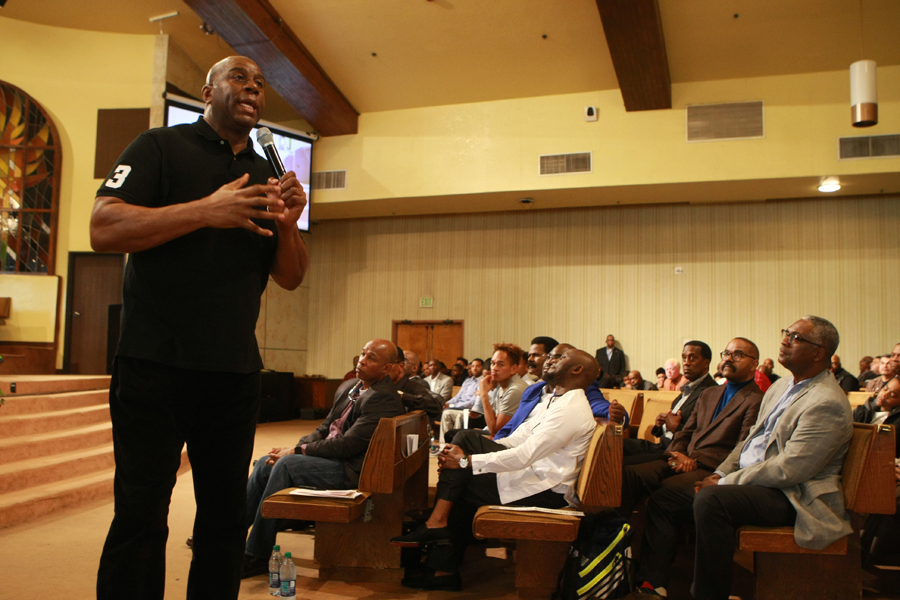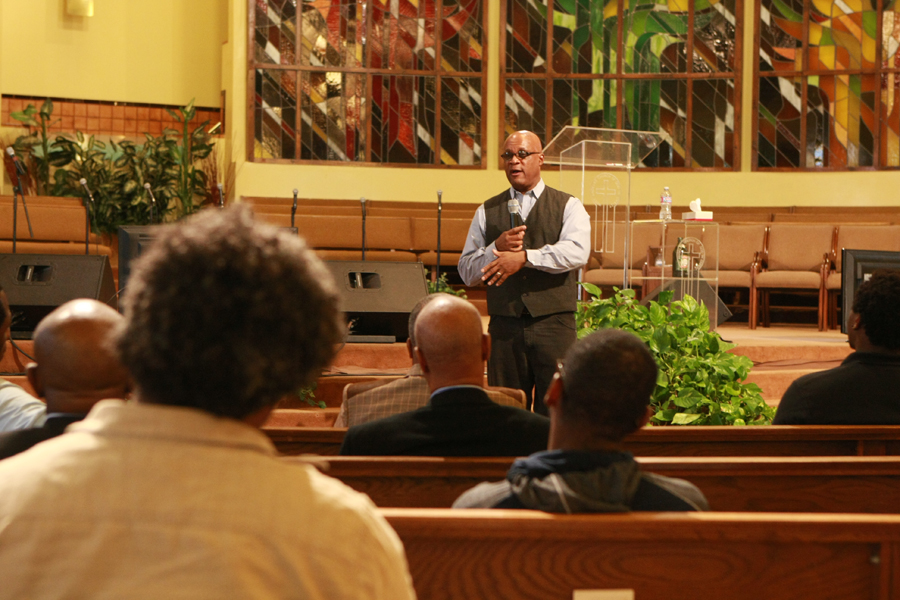Pacific Coast Regional CEO Mark Robertson expressed that we need to support our own at West Angeles Church of God in Christ’s Super Saturday event.

By Jason Lewis
Mark Robertson told a crowd of Black men during a business workshop that he likes to deal with numbers. But those numbers looked pretty bleak.
Reading from a report from the the 2012 U.S. Census, Robertson said that 13 percent of the Unites States is Black, 17 percent Hispanic, five percent Asian, 37 percent minority, and 63 percent non-minority (White).
Robertson went on to say that there are 5.1 million businesses in this nation that have employees. Out of those businesses, only 2.1 percent are Black owned, 5.6 percent are Hispanic owned, 9.3 percent are Asian owned, 17.7 percent are minority owned, and 83.2 percent are non-minority owned.
Those businesses produced $8.6 trillion in sales. Black businesses account for only 1.1 percent of that. Hispanics 3.4 percent, Asians 6.7 percent, minorities 12 percent, and non-minorities 87.2 percent.
Employee wise, only 1.8 percent are Black, 4.4 percent are Hispanic, 7.2 percent are Asian, 14.1 percent are minority, and 84.5 percent are non-minority.
These numbers show that Blacks and Hispanics are underrepresented when compared to their population, Asians are slightly overrepresented, minorities overall are underrepresented, and non-minorities, across the board, are dramatically overrepresented.
While the numbers are well known, Robertson, who is the CEO of Pacific Coast Regional (PCR), offers some solutions.
“The Black community was the lowest in those statistics,” he said. “How can we fix that? The only way to fix it, if you’re not inclined to go into business yourself, and if we’re going to enlarge our territory, we need to purchase from and support those Black businesses. It’s up to us. Asians buy from Asians, and there’s nothing wrong with that. They’re doing what they’re supposed to do. Hispanics buy from Hispanics. Not only do Asians buy from Asians, but Asians do business in the Black community. So if we’re going to have our own economic development, we have got to be about the business of supporting Black businesses. When you’re prepared to buy that next set of shoes, that next set of tires on your car, your next suit, when you need a paint job on your house, do you ask yourself if the business is Black owned?”
PCR recently celebrated their 40th year of being a community development financial institution that specializes in small business.
“We’re here because there was a group of African Americans who recognized then, as is the case now, that access to capitol is an issue for Black-owned businesses,” Robertson said.
Maxine Waters, who was in the State Assembly at the time, helped write the laws that created PCR. Their mission is the promotion of community development, through the delivery of financial and educational services to underserved small businesses persons and communities.
“Who are the underserved?” Robertson asked. “Typically, people who look like us. Those that are last, the least, the left out. Those who cannot go into a bank and obtain a loan very easily for one reason or another. Those who can’t afford a $200 an hour consultant to come in and look at their books, or look through their finances and tell them what’s right or wrong about the business. That’s where we come in. We provide financial services, loans in particular, that would otherwise not be available to these businesses. And we provide coaching and classroom training. Coaching itself is free of charge.”
The classes are low cost, generally around $30, and loans start at $500. PCR recently closed a loan for $3.1 million.
“Pretty much whatever financing is called for, to the extent that we can be comfortable with the transition, then we can be involved,” Robertson said. “For us, a satisfactory credit history is a FICO score of 600. You can see the difference in what we’re able to do than what you would find at a regular financial institution.”
The requirements to obtain a business loan from PCR are not as strict as at a typical bank, and PCR does not require as much collateral. In certain situations, they can accept the best available option.
“We don’t require that you own real estate to participate in our program,” Robertson said. “If you have it, we do look for you to support the transition with a lien on it, but it’s not required that you have it to get loan from us. When I say best available, that could be a car. We had two young people a couple years ago who were recent USC graduates. One of the young men put up a watch that his grandfather left for him. That was for a $25,000 loan. And they paid it back early.”
Many entrepreneurs do not have business experience, and some tend to figure it out as they go. PCR fills in those gaps so that business owners can succeed.
“The Bible reminds of that without counsel, plans fail,” Robertson said. “But with many advisors, plans succeed. And we are hopeful to be one of your advisors in your business venture.”
Robertson advises that first, people should pick a business that they are passionate about in a field that they are an expert in. In a previous interview with The Standard, he told the story of an investment banker who received a loan to open a restaurant. While he was a successful businessman, he had no experience in the food industry, which led to the failure of that business. But one of PCR’s long-time clients was a successful barber, and she opened her own barbershop on Crenshaw Boulevard 20 years ago. She is still in business today. PCR recently helped her obtain a grant through Metro’s Business Interruption Fund.
“It should be something that you enjoy so much that you’d do it as a hobby,” Robertson said. “It just so happens that you’ve created an avenue in your business that will allow you to make money at doing what you enjoy.”
Robertson also advises that entrepreneurs know their competitors, the specifics about their products, marketing, and have a strong management team.
“If you don’t have anything else, you have to have strong management,” he said. “You’re not required to know everything, but at the very least you need to have the right team to make sure that all of your weaknesses, all of those gaps, are filled.”
A financial plan is also extremely important.
“You need to pencil out what your financial needs are,” Robertson said. “Please do not seek a loan out, and go to any lender and ask, ‘How much can I borrow?’ You need to tell them how much you need. I can’t tell you how many times I’ve been approached with that question. I can’t answer that for you. You need to know that.”
Business owners need to know how the loan will benefit them, and what the sales projections are. A business plan that is created by the business owner is of great importance.
“I don’t know how many meetings I’ve sat in, where somebody comes to me with a finely prepared, glossy business plan,” Robertson said. “But they can’t tell me what’s in it. They don’t understand what’s in it. They paid somebody $2,000 to put it together. It doesn’t matter to me if your business plan is hand written. At least it’s done by you. You’re able to tell me what your business is, where you’re planning to go with it, what it’s going to cost to get there, why you’re different in the industry. That’s what you need to be able to do.”
PRC has courses to help people figure out what they need, and how they can obtain it.
For more information about PCR, contact them at (213) 739-2999, or visit their website at www.pcrcorp.org.










